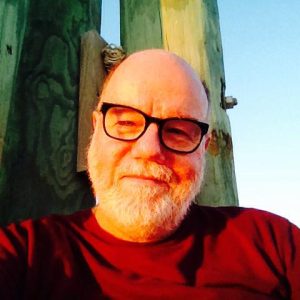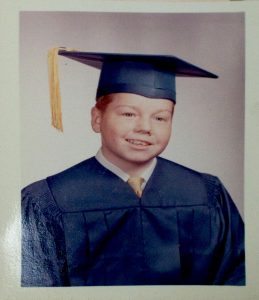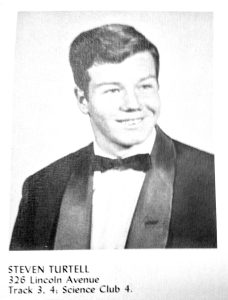Active Voice is a new addition to Bunny Island Key West where writers discuss various aspects of the craft of writing. Sometimes this section will provide commentary on a particular experience, share hard won information on craft, or offer musings on the state of the art. Steve Turtell, poet, blogger, photographer and now memoir writer is my first invited guest blogger.
“All that is prearranged is false . . . . . How do I know what I think until I see what I say,”
E.M. Forster, Aspects of the Novel p. 101

In1995 I was forty-five, in the MFA program in poetry at Brooklyn College, and teaching for the first time in my life. In the single class we had in how to teach basic composition, one of our assignments was a brief autobiographical essay. I wrote about my very first memory, of a nighttime sky glimpsed from within my hooded baby carriage. Even as an infant, I was so mesmerized by the beauty of a rectangle of liquid sapphire, that I have never forgotten it. After the class I put aside the essay, but it haunted me. It was the beginning of a memoir that I am now, nearly twenty years later, close to finishing. It has taken me that long to discover that all along, I actually was writing the memoir I needed to write, I just didn’t know it.

My first idea, right after grad school, was to write a straightforward autobiography, called Trying To Be Ordinary. The theme was my nearly always unsuccessful attempt to fight against the effect that being gay had on what might have been a simple life with a conventional trajectory: school, college, career, family, retirement. The longer I wrote the more I realized it was unsatisfying—mainly because it was becoming a standard gay memoir. Even in the late 90s I thought there were already enough of those, all of them centering on coming out.

Then, realizing that I had to write about what was unique to me, it became an example of yet another over-populated genre: the trauma memoir. I had more than enough material for both of these memoirs, and there was clearly a market for them, but I stopped. I had trouble not only with the subject matter, but the writing itself. The tone was wrong. I couldn’t seem to escape the influence of many of the memoirs I’d loved, or resist the temptation to try to write as beautifully as some of my favorite prose stylists (typically, I love best what I can’t do well myself and literary dandies are my downfall). I kept falling into a grandiose elegiac tone. Also, it was all exposition, very little story, and most of it read like the things I removed almost without thinking from the poems I was starting to publish and that ended up in my first book, Heroes and Householders. Looking back, I realize I was teaching myself to write narrative prose.
I made slow progress. For a long time I couldn’t tell when something was getting better through revision, which was obvious to me in a poem Then, sometime in 2005 I had a better idea. I thought that I could split my life, as I had often lived it, into the two spheres of public and private. I would write two memoirs, one called Business Address, the other Home Address. I’ve had a zig-zag work life and several different “careers” although I never viewed them as anything other than a way to earn a living. But having been a lighting designer, a baker, a journalist, a teacher, museum administrator, and a fundraiser (among other things)—i.e. , had the kind of life I used to see written in thumbnail fashion on many author bios—I began writing what for the last three years I started calling At Work: Fifty Jobs in Fifty Years. Once I finished that, I thought I could tackle the more difficult, more personal memoir Home Address, but with a similar structure: a chapter for each of the 20+ places I’ve lived: Brooklyn, Leonardtown Maryland, Manhattan, San Francisco, London and Key West. The structure for both would be the same: the memoir as picaresque novel, with frequent changes of scene, and a large cast of subsidiary characters entering and leaving my life, who would allow me sometimes to take the focus off myself.
By last fall, I’d written over 35 chapters for At Work, made notes for the remainder and published many of them on my blog (https://steveturtell.wordpress.com/)* hoping to build an audience and possibly even interest an agent or publisher. I’d not written the chapters in chronological order. I wanted to generate the most variety by jumping around. But with the majority of my jobs covered, I thought I should begin to see how they stacked up as a single narrative.
When I put them in order and printed it out, I was distressed. Most of them were not narrative enough. And it was hard to see how I could produce a through line, an overall arc of meaning. This stalled me for several months. But one day, reading through the unwieldy manuscript yet again, I noticed something. The best chapters all concerned the effect being gay had had on my work life. After getting expelled at 14 from a religious boarding school in 1965 simply for telling the headmaster I was gay (I was hoping to stop the constant harassment I got from another student) I became a gay activist and vowed I’d never hide who I was no matter the cost. I’d found my through line. And it wasn’t going to be a typical gay coming out memoir. Instead it would depict not just my life, but the life of the culture around me as it changed year by year, decade by decade. I dropped the title, At Work: Fifty Jobs in Fifty Years. Instead, it is now called “Her Name Is George”: Out at Work from Stonewall to the Present. The title is what I literally said to a young Latino I supervised in a bakery in 1976 when he asked: “So, Steve. You got a hot date tonight?”
“Yeah, I do.”
“Cool, man, what’s her name.”
“Her name is George.”
Twenty years after writing that first essay, five years after beginning the first of two planned books, I found my direction and can now see my way to the end. I’ve even written a dozen of the most important chapters, although they will all have to be revised. The best part of this, frustrating as it’s sometimes been (I’ve often wanted to give up) is that I couldn’t have planned it if I tried, any more than I could have anticipated my very first coming out, at the age of fourteen.But even then language itself, the power of a single word, was at the heart of the story: https://steveturtell.wordpress.com/about
To date, my blog has had over 8,000 visitors from 65 countries.
Steve Turtell is a poet who lives in New York City and Key West. His collection of poems, Heroes and Householders, was published in 2009 by Orchard House Press and was reissued in May 2012 in an expanded second edition. His 2001 chapbook, Letter to Frank O’Hara was the 2010 winner of the Rebound Chapbook Prize given by Seven Kitchens Press and was reissued with an introduction by Joan Larkin in 2011. He is currently at work on “Her Name is George”: Out on the Job from Stonewall to the Present, and Peter Hujar: Invisible Master. You can follow him on Twitter as @rdturtle and friend him on facebook.
(My review of Heroes and Householders can be found here.)

I thoroughly enjoyed this post. What was reaffirmed to me as I read it was the sheer amount of work, of coaxing and cajoling that is required to bring something new into being. Long-term projects like your memoir fascinate me. Once you’ve put a certain amount of work into something you may as well hold it close until it’s really truly done. I look forward to reading it.
Thanks, Katie! PreShe8It!